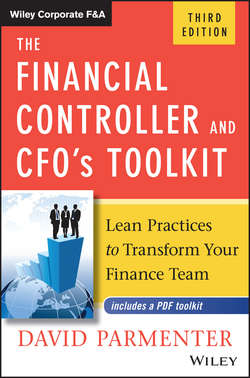Читать книгу The Financial Controller and CFO's Toolkit - Parmenter David - Страница 10
На сайте Литреса книга снята с продажи.
Part I
Change – Why the Need and How to Lead
Chapter 1
Getting Your Finance Team Future Ready
LEAN MOVEMENT
ОглавлениеThe finance team needs to embrace the lean movement to slim down all of its processes so it can be less locked in to the past. This change will have an impact on the workload of the team, as shown in Exhibit 1.2, which compares an antiquated team and a lean finance team.
EXHIBIT 1.2 Lean versus a non-lean finance team
The significant increase in advisory time will lead to:
● Adding more value to the business units the finance team supports
● Selling and leading change, in particular with regard to new systems
● Leading the battle against waste as Jeremy Hope has suggested3
● Having time to adopt the profound lean practices such as Post-it reengineering, Scrum, Kanban, and action meetings
The end result will be participating in more rewarding work and a happy and more fulfilled finance team.
Background to the Lean Movement
The lean movement is largely credited as a Japanese process that was responsible for the meteoric rise of the Japanese multinationals over the period 1960 to 2000. However, when you look at its origins, you see the influence of American writers such as Edwards Deming. Over the years, there have been many institutes and consultancy methodologies that make up the lean movement as we see it today.
The lean movement has been part of workshops for more than 20 years, but lean accounting has been a much more recent phenomenon lead by a series of thinkers and dates back to roughly 2004. The key players include:
● Jeremy Hope4
● Brian Maskell5
● Jean Cunningham6
● Frances Kennedy7
Although most corporate accountants are aware of the revolution of lean and its positive impact on private, government, and nonprofit sectors, few have realized the profound impact it has on the accounting function. The pioneers of lean accounting have now blazed a pathway that all corporate accountants need to walk along.
Indeed, the lean accounting movement has been gaining momentum around the world. Thus, it will not be long before CEOs start asking questions about this hot topic. It is imperative that corporate accountants, sooner rather than later, understand the concepts of lean accounting and its implications for their finance team and organization.
In fact, the movement has progressed to such an extent that there is now an annual lean accounting summit, which can be found easily on the Internet.
Lean Is About Eliminating the Eight Wastes
In lean there are eight types of waste. These wastes are seen within the whole organization and within the accounting function. I have outlined the eight wastes below:
“Most businesses processes are 90 % waste and 10 % value-added work.”
– Dr. Jeffrey Liker
Liker points out that Boeing reduced over a trillion internal transactions through adopting lean.
Toyota's 14 Lean Management Principles and Their Relevance
I believe Toyota to be possibly the greatest company in the world. It has 14 lean management principles which are the backbone to its culture and Toyota can embed these principles in all countries it operates within. Its Kentucky plant in the USA exceeded all Toyota expectations with its acceptance of the Toyota Way. To understand the Toyota principles one needs to read Jeffrey Liker's book The Toyota Way. He has broken them down into four categories as set out in Exhibit 1.3.
EXHIBIT 1.3 Jeffrey Liker's analysis of Toyota's 14 principles
Source: www.jeffliker.com
I believe that Toyota's 14 principles should be embedded in all private, government, and non-profit agencies as best they can. They would make a profound impact on the organizations, benefiting the staff, management, board, and customers. I have included an overview of Toyota's 14 management principles in the attached electronic media.
3
Jeremy Hope, “Reinventing the CFO: How Financial Managers Can Transform Their Roles and Add Greater Value,” Harvard Business Press (2006).
4
Ibid.
5
Frances Kennedy with Brian Maskell, “Why Do We Need Lean Accounting and How Does It Work?” Journal of Corporate Accounting & Finance (March/April 2007).
6
Jean Cunningham, “The Lean vs. Standard Costing Accounting Conundrum,” Finance & Management Faculty Journal, ICAEW (June 2012).
7
Kennedy and Maskell.
